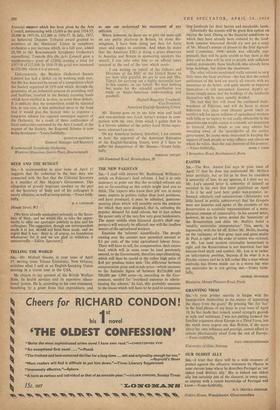THE NEW PAKISTAN Sta.,—I read with interest Mr. Rushbrook Williams's
article on Pakistan's land reforms. I feel it is only necessary to point out that the so-called reforms are not so far-reaching as this article might lead you to think. The 'experts who know their job' are, in many cases, experts in politics rather than land problems, and have produced, it must be admitted, generous- seeming plans which will possibly serve the purpose for which they were designed, that is, softening the popular demand for land reform, but in fact reduce the power only of the very few very great landowners, The upper middle class (General Ayub's chief sup- porters) will scarcely be affected; nor will the landless masses of the agricultural workers.
Examine the 'reforms' scientifically. The people owning over the amount now permitted amount to 0.1 per cent. of the total agricultural labour force. These will have to sell, for compensation, their excess land, which will in some cases be land previously unused, to the.Government, therefore unprofitmaking, which will then be resold at the rather high price of Rs8 per produce index unit. The difference between compensation price and re-sale price—which amounts to the fantastic figure of between Rs216,000 and 500,000. per 1,000 acres—is, according to the Gov- ernment, needed for 'overhead expenses in admin- istering the scheme.' In fact, this probably amounts to the losses which will have to be paid in compensa- ting landlords for their barren and unsaleable lands.
Admittedly the tenants will be given first option on btiying the land. Owing to the financial conditions to which they have already been reduced by the land- lords (anyone interested should try and get a copy of Mr. Masud's minute of dissent to the Sind Agricul- tural Committee, 1948—which was officially sup- pressed), they will be quite unable to buy them at the price and so they will be sold to people with sufficient capital, presumably those landlords who already have large holdings, but below the maximum.
The other reforms mentioned really amount to very little since the basic problem--the fact that the actual cultivators of the land are nearly all tenants with no incentives to do better, and quite unable to improve themselves—is left untouched. General Ayub's re- forms simply mean that the holdings of the landlords themselves will be more equally divided.
The fact that this will mean the continued back- wardness of Pakistan, and will do harm to many industries too, since even cheaper goods (such as textiles) will for many millions of agricultural workers with little or no money be not easily obtainable in the quantities one would expects is evidently not important to General Ayub. Much as one may admire his sweeping away of the ' spendthrifts of the earlier government, he seems more interested in keeping the support of such people as army officers and others on whom he relies, than the real interests of his country.
2 Brownlow Road, Berkhamsted, Herts






































 Previous page
Previous page